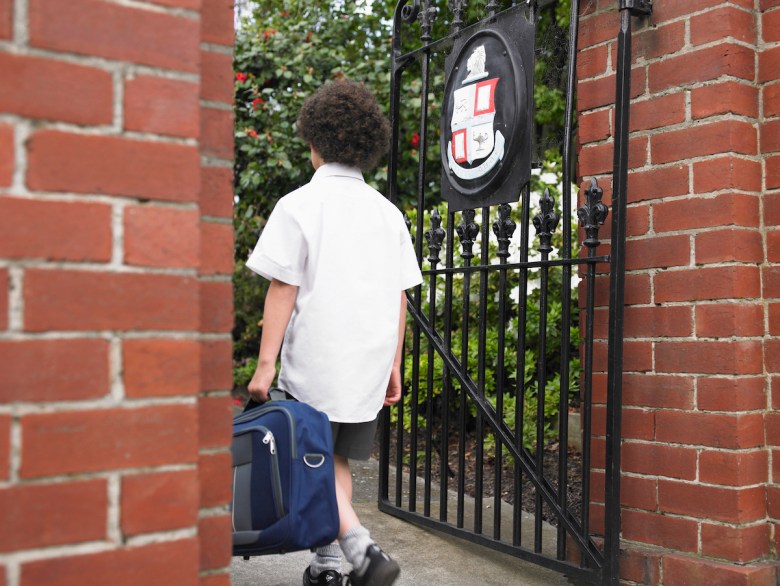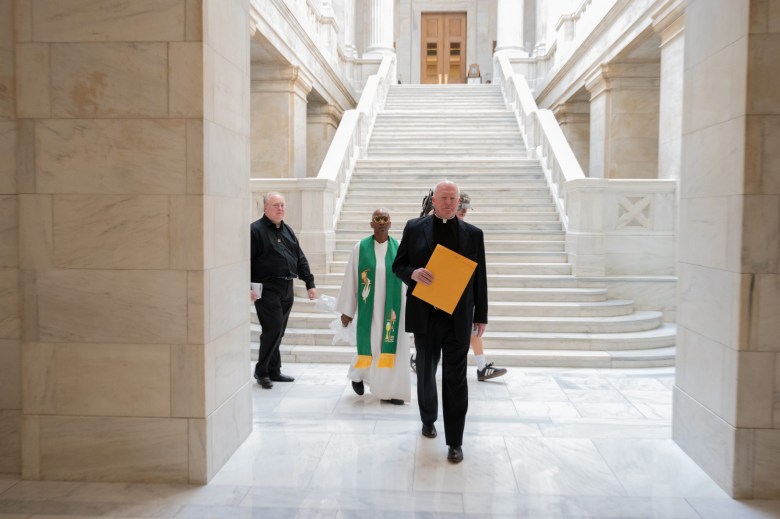Tuition at the private schools that get state funding has increased in tandem with the growth of the Arkansas school voucher program.
The Educational Freedom Account program, established in 2023 under the LEARNS Act, has made state funding available for permissible educational costs, including tuition for private schools. This fall marks the first time that the program, which has been phased in over three years with growing eligibility, is available to all students.
“160 of the 164 schools that applied for the 2025-2026 school year have been authorized to participate,” said Kimberly Mundell, a spokesman for the Arkansas Department of Education. In 2023–2024, students utilized the EFA program at 97 schools during its first year, and 126 schools during its second. According to Mundell, other schools were permitted to take part in both years but did not have any pupils who used EFA monies.
The average private school tuition for the 2025–2026 academic year is approximately $8,800, which is more than the approximately $7,000 the state will give each kid this year, according to an Arkansas Advocate analysis of private school tuition that was received through a public records request.
According to the Advocate’s investigation, the average tuition increase for the 93 institutions that took part in the program for all three years was roughly $1,400.
The biggest three-year increase was $5,725 at Immaculate Conception Catholic School in North Little Rock.
If ADE finds that tuition or fee increases are arbitrary or unfair, it may exclude schools from the program in accordance with EFA program guidelines. Mundell responded that each private school’s tuition is examined separately to make sure it complies with state law when asked if a school’s planned increase has ever been denied.
According to Mundell’s email, the department considers each school’s proposed tuition before approving it for the following academic year. The department gets in touch with the school to find out more if there are any issues.
High and low tuition
This year, the K–12 tuition at Fayetteville Christian School, which has been a part of the EFA program since its beginning, jumped from $3,000 to $6,000. The additional expenses that students paid last year, which are included in this year’s tuition, ranged from $700 to $850. The school’s application states that on December 9, its superintendent gave ADE the 2025–2026 tuition schedule along with a justification for the increase. According to the application, the raise was examined and pre-approved by an official that same day.
In its application, Calvary Christian Academy, which enrolled in the program the previous academic year, listed three justifications for this year’s tuition increase of $2,900 to $6,200. According to Berryville school officials, they didn’t charge the entire fee because they didn’t want to financially harm families who weren’t eligible for the EFA program. Additionally, they failed to charge for some technical and operational expenditures that they were unaware could be covered by the EFA program. According to the application, the tuition increase will also give instructors and staff a well-earned rise.
PLUM’s St. Howard’s Academy in Forrest City has the most annual rise, raising tuition by about $5,100 to $12,000. Participating schools saw an average tuition rise of almost $860 over the previous year.According to its website, the PLUM Foundation is a nonprofit organization that works to improve communities in underprivileged parts of the state.
The lowest tuition for K–8 kids is $2,000 at Bonnerdale’s Ewing Adventist Junior Academy, which is a new participant.
The highest tuition for high school pupils is $29,300 at Bentonville’s Thaden School. Last summer, Michael Maloy, the head of school, informed the Advocate that Thaden has a comprehensive financial aid program that includes indexed tuition, which means that families pay based on their income.
Excel High School, Northgate Academy, and Veritas Scholars Academy are three new EFA partners that are not included in the Advocate’s research since their fees fluctuate depending on the number and kind of courses pupils enroll in, rather than standard tuition.
Doing more
Principal Nyesha Greer chose to wait until this autumn, when all of her pupils would be eligible, even though Christ Academy was approved to take part in the first year of the EFA program.
The church-affiliated Newport school, which debuted in 2018 and can accommodate about a dozen kids in grades 6–8, has always relied on grants and private donations for finance.
The tuition fee of $6,500 per student will be charged for the first time this year. That is slightly less than the $6,994 that each EFA student is receiving this year. In the first year of the program, the EFA amount per student was $6,672, and in the subsequent academic year, it was $6,856. The amount each year was determined by the public school foundation grant per student from the previous year.
Delaying enrollment in the EFA program was the best course of action, according to Greer. According to her, the school will be able to expand extracurricular activities and offer additional programs thanks to the state support, which will also lessen parental worry.
It simply indicates that we will have a little more capacity. “It gives us opportunities,” she remarked.
Esmerki De Los Santos, the principal of Fe Viva Christian School, expressed similar views. Iglesia Bautista Fe Viva, a separate Baptist church in Rogers that speaks Spanish, is the parent organization of the school. According to De Los Santos, the school emphasizes bilingual education while offering lessons in English.
This year, Fe Viva, who joined the EFA program last year, will be teaching close to fifty pupils in kindergarten through 12th grade. Prior to this, the school had far less funding, and even though many parents were struggling financially, De Los Santos claimed that they nevertheless provided education to their children. According to the principal, the school will be able to provide kids with meals and other resources this year thanks to the EFA funds.
It’s transformative. According to De Los Santos, it’s transformative for both the school and them.
Kindergarten through seventh grade tuition at Fe Viva is $6,000, while eighth through twelfth grade tuition is $6,500. According to De Los Santos, they take into account both Northwest Arkansas tuition costs and the cost of education when determining tuition.
Because we deal mostly with bilingual families, we are likely among the least expensive in the area, he said. We reach out to families that would not otherwise be able to afford any other kind of private school because we speak to many Hispanic families who would like to provide their children with a better and more Christian education.
While he s grateful for state funding, De Los Santos said that, in the back of his mind, there s always a concern about how the EFA program could shift in the future, such as new rules infringing on the school s religious liberty or if funding runs out. According to De Los Santos, EFA funding accounts for 80–90% of Fe Viva’s budget, and he is unsure if parents could afford tuition in the event that the program is discontinued.
Greer also stated that she is aware of how the program may change if a new governor is elected.
“I’ve considered that, but I’m not worried,” she remarked. In my opinion, this is not a deciding factor in our success because we have previously been able to function. This is only something that happens and is really beneficial to us at the moment.
Covering all applicants
The state has approved $277 million for the program s third year; however, there are plans to fund every approved application, Mundell said. Applications were due on August 1st for schools and August 15th for students. Whether more students will be permitted to apply later in the year is still up in the air, according to Mundell.
As of Thursday afternoon, ADE had received 50,630 total applications 29,836 private school students, 20,782 homeschool students, 12 incomplete. Of those, 44,599 had been approved, including 27,779 private school students and 16,820 homeschool students.
By this same time in 2023 and 2024, ADE had approved participation for roughly5,000and12,000students, respectively.
Of the currently approved students, 456 are former recipients of the Succeed Scholarship. The program, which was absorbed into the EFA program, provided private school tuition for students with disabilities, foster children and military families.
Students who participated in the Succeed Scholarship during the 2022-2023 school year have continued to receive the scholarship amount awarded to them. Their funding has increased from $7,413 to $7,618 to $7,771 since the 2023-2024 school year.
The EFA program is only open to Arkansas schools, with the exception of the Madonna Learning Center in Tennessee, which has been allowed to participate in order to continue serving a former Succeed Scholarship recipient. The school will not be allowed to continue in the EFA program once the student graduates, Mundell said.
ADE did not have data on when the last of the former Succeed Scholarship students are expected to graduate, but Mundell said graduation data will be presented in the annual EFA report. The program srulesrequire that a legislative report be submitted no later than Sept. 30 each year.
Data was collected from Educational Freedom Account program applications provided by the Arkansas Department of Education through a state Freedom of Information Act request. Annual tuition rates for schools that provided weekly or monthly rates were calculated based on a 10-month school year.
Schools generally provided tuition rates for the 2025-2026 and 2024-2025 academic years. Some schools only provided one document for tuition rates. Although that may be because the tuition rate is the same for the current and previous year, only the tuition rate for the specific year listed on the document was included in the analysis.
Some schools included all fees in their listed tuition price, but the majority listed separate fees to be paid in addition to the tuition rate. The tuition rates in this analysis do not reflect discounts for things like being a church member or enrolling more than one child.
Arkansas Advocateis part of States Newsroom, a nonprofit news network supported by grants and a coalition of donors as a 501c(3) public charity. Arkansas Advocate maintains editorial independence. Contact Editor Sonny Albarado for questions:[email protected].
Partner Content by Arkansas Advocate
It’s dragon-slaying time!
In a time when critical voices are increasingly silenced, theArkansas Timesstands as a beacon of truth, tirelessly defending the fundamental rights and freedoms within our community. With Arkansas at the epicenter of a sweeping culture war affecting our libraries, schools, and public discourse, our mission to deliver unflinching journalism has never been more vital. We re here to slay dragons and hold power accountable, but we can t do it alone. By contributing today, you ensure that independent journalism not only survives but thrives in Arkansas. Together, we can make a difference join the fight.







